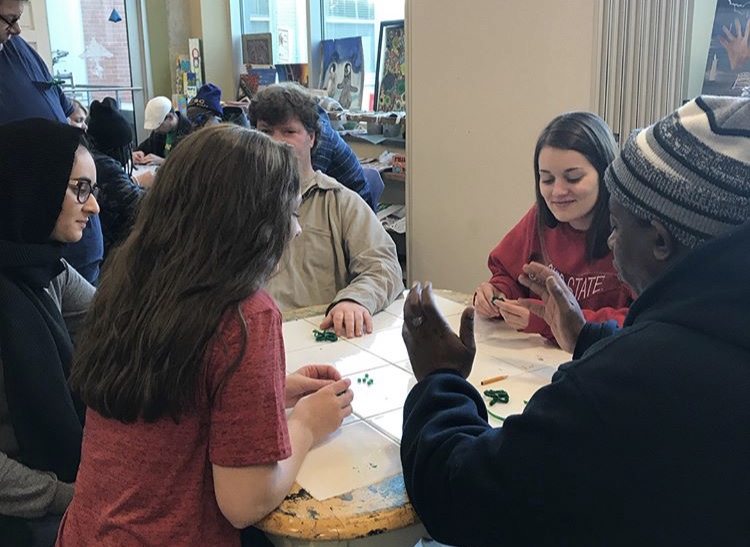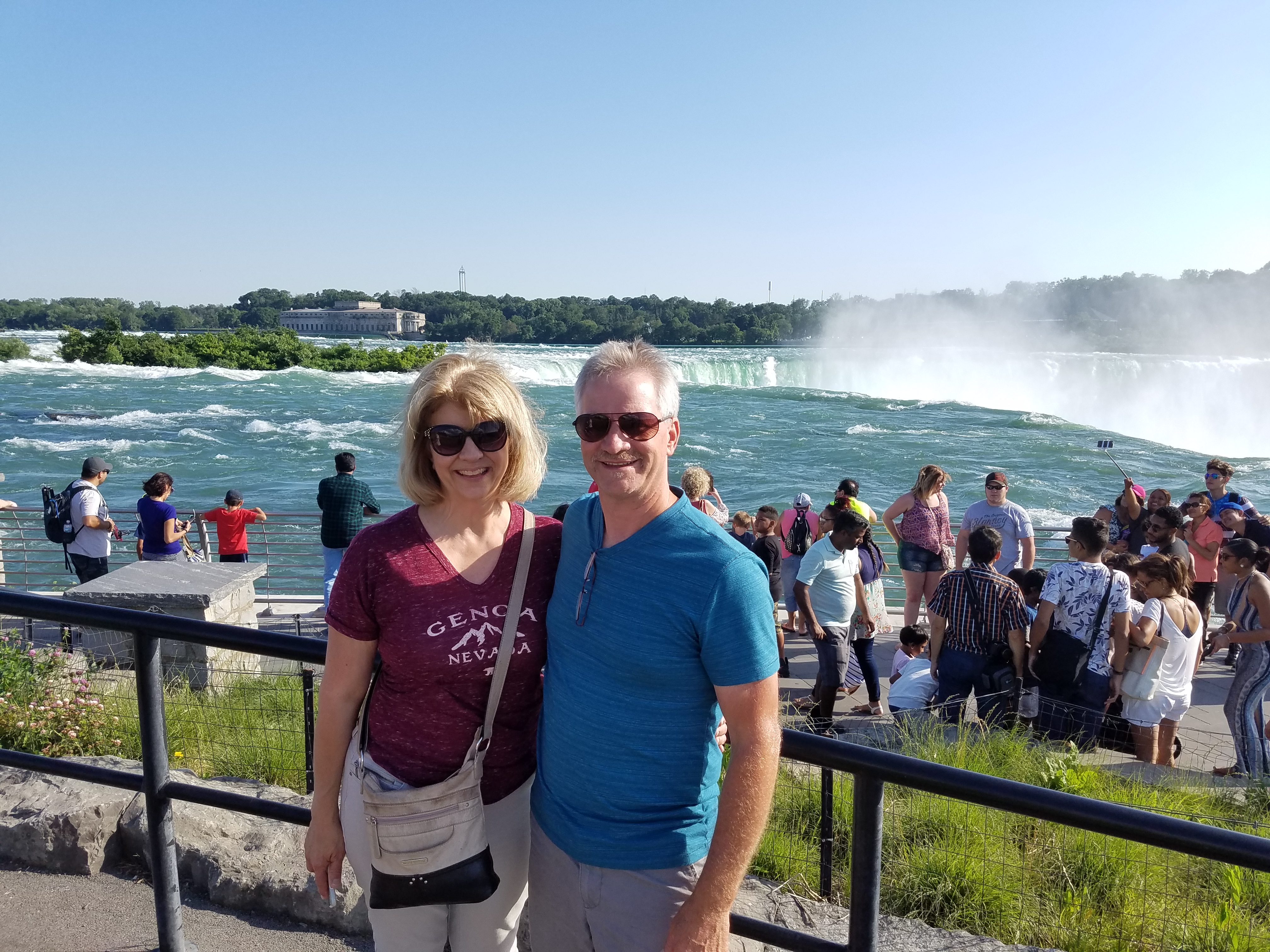
Barbara Malpiedi Kirby is from Shadyside, Ohio and currently lives in Garner, North Carolina. She graduated with her bachelors degree in Environmental Education and her masters degree in Agricultural Education. She is currently at North Carolina State University, Professor of Agricultural and Extension Education.
[ACEL]: Hello Dr. Kirby! Why did you choose to attend The Ohio State University?
[Kirby]: My father, aunt and one cousin graduated from The Ohio State University. My dad had season football tickets. Needless to say, my brother and I started at a very young age cheering the Buckeyes in the Shoe for many years. Everything about the university and Columbus intrigued me. I could not imagine going to school at any other university. Only three students from my high school graduating class began college careers at Ohio State. The university felt like home to me even though it was so big.
Why did you select your major or graduate program?
I grew up in a small town in southeastern Ohio, Shadyside, OH. My grandfather had a small family farm and loved hunting and fishing. He inspired my passion for agriculture and natural resources. While the livelihood of family members and friends depended on the success of the coal mines, steel mills and power plants along the Ohio River, the degradation of the environment saddened me. I attended The Ohio State University and majored in natural resources for my B.S. degree. My internship at Oglebay Park Nature Center in Wheeling, WV was a turning point for me. I loved teaching all age groups at the Center and decided to obtain my natural resources teaching license through agricultural education. The agricultural education faculty members were passionate educators and motivated me to complete my master’s degree while I was teaching.
How did your education at Ohio State influence your choice of career or your career path?
When I came to Ohio State, teaching was not one of my career aspirations. Drs. Newcomb, Knight and Barrick taught the intro course, teaching methods and agricultural education program courses Dr. Jim Knight, with his ton of positive vibes, supervised my student teaching. Their enthusiasm and passion for teaching was contagious and launched me into a teaching career. After graduation, I taught high school natural resources/environmental sciences at the Ashland County – West Holmes JVS in Ashland, Ohio. My greatest joy was managing our 80-acre teaching land laboratory. Although I loved teaching high school students and managing the land laboratory, my real passion was mentoring student teachers. I still remember the conversation with Kirby Barrick about the possibility of pursuing a doctorate. My career path turned to higher education.
What were you involved in as an Ohio State student?
Since my participation in the agricultural education program was late into my undergraduate program, I did not have much time to be involved as an undergraduate in ag student organizations. I was a member of the Student Ag Council and the Agricultural Education Society. The Fall Fest was a big event for us. I was also a member of Zeta Tau Alpha National Fraternity and served in several officer positions, including president and was a member of the Panhellenic Association Presidents’ Council. As a graduate student, I was inducted into Gamma Sigma Delta.
What classes did you enjoy the most while at Ohio State?
My favorite classes were the environmental education and agricultural education major courses. I enjoyed the park and recreation planning and programming courses. The projects were a lot of fun and enabled me to use my creativity. Jim Knight taught my Intro to Agricultural Education class. Witnessing the personal interest Dr. Knight took in each of his students has resonated with me throughout my career. I have always tried to acknowledge the uniqueness and importance of each student, especially as part of a large university. My ag ed courses prepared me to teach. I was not in a high school vocational ag program or a member of the FFA. Drs. Newcomb, Barrick and Hedges engaged us in the classes and afforded opportunities to apply and practice the competencies essential for classroom and laboratory success. Dr. Joe Gleim’s ag mechanics class was on of my favorite graduate classes. Relieved that I survived Dr. Larry Miller’s research course, the project driven ag mechanics course was a nice way to spend a summer. L.H can tell the rest of the story about the notorious patio our class built that summer.
What professor, faculty or staff member had an impact on your education?
I shared early how many of the faculty members impacted my education and career. However, Dr. L.H. Newcomb was probably the most influential. I appreciated his candor, patience and humor. L.H. assisted me with my licensure program and served as my graduate advisor. He along with many others provided much need guidance for an undergraduate who was not always on track and motivation for a grad student managing a full-time teaching job and evening graduate classes. I am also grateful that Dr. Newcomb decided to take a yearlong administrative internship in the dean’s office. Dr. Warmbrod invited me to join the staff that year as a post-doc lecturer. The experience solidified my goal of pursuing a permanent faculty position in higher education.
What is your favorite memory related to your time at Ohio State?
I have so many wonderful memories. I made great friends in the College of Agriculture and developed lifelong friendships through Zeta Tau Alpha. The memories are special because of the friends who were there in the 70’s still sustain me today. We are loyal, fanatic Buckeye fans. We loved the football games and now the opportunity to get together. As undergrads, it didn’t matter if we had to sit in Block O or in the rain or snow. A trip to the Rose Bowl in Pasadena, CA -was more than a girl from Shadyside could fathom. We had a great time. “How firm thy friendship, O-HI-O.”
What was your first job following your education at Ohio State?
Teaching students enrolled in the Natural Resources and Environmental Science program at Ashland County-West Holmes JVS in Ashland, OH was my first teaching position. Our FFA included the students in Ag Mechanic classes. I enjoyed teaching in a two-teacher department.
For what schools, companies and/or organizations have you worked throughout your career and what were your responsibilities in those positions?
Following my teaching position at ACWH JVS, I was a graduate assistant at Virginia Tech where I earned my doctorate degree. I taught undergraduate ag ed courses and supervised student teachers. After graduate school, I worked as a lecturer with the Department of Agricultural Education faculty at The Ohio State University. What a thrill to be part of this extraordinary program and a member of its faculty. My first tenure track faculty position was at NC State University in 1985. As an assistant professor, I taught several different courses: computer/instructional technology, introduction to teaching, history and philosophy (Foundations), and mentoring. I advised undergraduates and graduate students.
After moving through the ranks and achieving the rank of full professor, I moved to college administration. As the assistant/ associate director of academic programs, my worked involved student recruitment, new student program, directing the honors program and working with faculty on various college programs like the outstanding teacher program and Educational and Technology Funding. In 2009, I became the director of the Agricultural Institute, a two year associate degree program. Directing the Institute was a wonderful experience. The students valued ”hands on learning” so that they were prepared to return to their farms and agribusiness jobs. Several continued their education and completed BS degrees.
My last administrative position at NC State was associate vice provost for academic programs and services, a newly organized unit in the University Division of Academic and Student Affairs (DASA) at NC State University. DASA was a unique organization that integrated curricular and co- curricular components to improve the academic performance of our students and the quality of academic and non-academic experiences at NC State University. Major responsibilities included:
Leadership and specific administrative oversight for the overall University processing of courses and curricula and the General Education Program; Oversight of the First Year Inquiry program courses and faculty development; administrative management of the Environmental Science interdisciplinary degree program and the EcoVillage, Living and Learning Community.
After 18 years in administration, I returned to the faculty to resume my faculty role as a full professor. I am now teaching, advising, and conducting research in the newly formed Department of Agricultural and Human Sciences.
During your career, what honors or awards have you been presented?
Some of my most meaningful awards included the Honorary State and National FFA Degrees; Outstanding Teacher of the College of Education and College of Agriculture and Life Sciences; induction into the NC State University Academy of Outstanding Teachers; Outstanding Contributions to Undergraduate Education, NCSU Division of Undergraduate Academic Programs Award; NACTA Teacher Fellow; Food Systems Leadership Institute (FSLI) Fellow; and Senior Fellow in the American Association for Agricultural Education (AAAE). I also received the Distinguished Teaching Award from the American Association for Agricultural Education (AAAE), in the Southern Region. During graduate school, I was inducted into the following: Alpha Tau Alpha (National Honorary in Agricultural Education); Phi Delta Kappa (National Education Honorary); and Omicron Tau Theta (National Honorary in Vocational Education),
I was very honored to return to Virginia Tech to receive Virginia Tech’s Recognition of Generations of Women Teachers: Leader, Achiever, and Outstanding Alumna.
During my early career at NC State, I worked with the National Zeta Tau Alpha Fraternity and local alumnae in the construction of a local ZTA chapter house near the campus. I was presented the North Carolina Alumnae Themis Award for contributions to a collegiate chapter of Zeta Tau Alpha and National Certificate of Merit for contributions to a collegiate chapter of Zeta Tau Alpha.
As of today, what is your favorite career highlight?
Wow. There are many. My teaching and administrative career spanned multiple levels of education: high school teacher, two-year associate degree program director, faculty member in a major land grant university engaged in undergraduate and graduate education and administration at the college and university levels. Certainly, earning my doctorate degree was a highlight. The experience humbled me and opened the door for a career in higher education spanning 33+ years. My education and training positioned me to help others. When I can mentor or help a Jr. faculty member or administrative colleague, that resonates with me as a career highlight. Any time I can help a student especially those who find themselves in challenging situations, that is a career highlight. I probably experienced several of those situations myself. Certainly, becoming an associate vice provost is a career highlight. More importantly, in that role, I was able to help a graduate student from Nigeria navigate the red tape and bureaucracy in order to resolve his admission issues and complete a master’s degree in agricultural and extension education. Celebrating his success at graduation with his family (who flew from Nigeria) and all who had been part of his NC State experience was certainly a career highlight.
What advice would you give to a current student?
Don’t ever under estimate yourself. Listen to the advice of your faculty. Make the most of every collegiate experience. That includes curricular and co-curricular experiences. In particular, study abroad, engage in service learning, seek challenging internships, network and build friendships. Everything you do positions you for the next level. Enjoy your time at the university and take charge of fulfilling your dreams.
What did ACEL cultivate in you?
Being part of ACEL cultivated in me a passion for teaching, determination, perseverance, dedication and compassion. While I would attribute my acquiring many of these attributes to my upbringing, the faculty and fellow students in ACEL nurtured my desire to be a successful educator. Many people along the way have continued to cultivate and support even my craziest of idea and dreams.















